14
Signs & symptoms of pregnancy
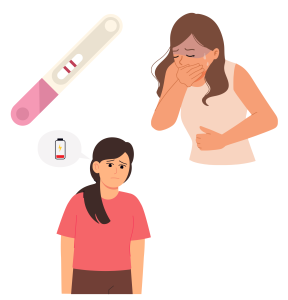 In the early stages of pregnancy, several common symptoms may present themselves. These include a missed menstrual period, nausea and vomiting, changes in breast sensitivity or size, increased fatigue, and more frequent trips to the bathroom. Recognizing these signs can be important for early pregnancy awareness. It is important to note that these symptoms could be attributed to various factors. Therefore, taking a pregnancy test and consulting with your healthcare provider is advisable for accurate assessment and guidance.
In the early stages of pregnancy, several common symptoms may present themselves. These include a missed menstrual period, nausea and vomiting, changes in breast sensitivity or size, increased fatigue, and more frequent trips to the bathroom. Recognizing these signs can be important for early pregnancy awareness. It is important to note that these symptoms could be attributed to various factors. Therefore, taking a pregnancy test and consulting with your healthcare provider is advisable for accurate assessment and guidance.
As pregnancy progresses, women may experience a variety of common discomforts and changes. These can include backaches, headaches, leg cramps, and varicose veins. Additionally, some may face issues such as constipation, hemorrhoids, increased vaginal discharge, and fluctuations in mood. Being aware of these potential symptoms can help in managing them effectively.
Pregnancy symptom management
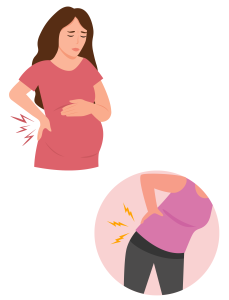 Backache
Backache
Backaches during pregnancy often occur due to ligaments relaxing and shifts in posture that result from the increasing size of the belly. These physical changes can lead to discomfort as the body adapts to support the growing baby.
To alleviate back pain:
- Consider avoiding high heels
- Use chairs that provide proper back support
- Refraining from lifting heavy objects
- Engage in low-impact activities like water aerobics
Breast changes
During pregnancy, it is common for breasts to undergo changes such as an increase in size, tenderness, and swelling. Additionally, the skin surrounding the nipple may darken, and the visibility of veins may increase. These changes are part of the body’s preparations for breastfeeding and the overall hormonal shifts that occur during this time.
Constipation
Constipation is defined as infrequent and difficult bowel movements, often characterized by hard stools that are challenging to pass. This condition is particularly common during pregnancy due to hormonal changes that slow down the gastrointestinal tract. Additionally, the pressure exerted by the growing uterus on the rectum can contribute to this discomfort.
- Drink an adequate amount of water each day
- Incorporate more fiber into your diet is also beneficial; foods such as bran, wheat, fruits, and vegetables are excellent sources
- Engage in slow, low-impact exercises like swimming, walking, or yoga
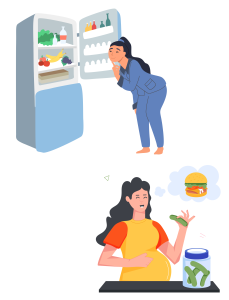 Cravings
Cravings
Pregnancy cravings often include foods that boost energy levels and provide essential calcium, such as milk and dairy products. Some women may experience aversions to certain foods during this time. Additionally, some may develop an unusual desire for non-food items, such as soil or paper; this phenomenon is known as “Pica” and may suggest a nutrient deficiency. If you notice these symptoms, consult with your healthcare provider.
Hand numbness and tingling
Carpal Tunnel Syndrome (CTS) is characterized by tingling and numbness in the hands, impacting around 60% of pregnant women. This condition arises from the compression of the median nerve, often due to more tissue fluid in the body. The severity of carpal tunnel syndrome can vary, but it typically subsides after childbirth. If you notice numbness or tingling in your hands, it’s advisable to consult your healthcare provider. Occupational therapists can also provide you with exercises, orthotics, taping, and behavioral and ergonomic considerations for CTS.
Headaches
If you experience recurring headaches, it is important to consult with your healthcare provider. This symptom may indicate the possibility of pre-eclampsia, a condition that can impact kidney function, elevate blood pressure, and reduce blood flow to the baby.
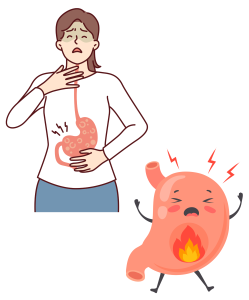 Heartburn and indigestion
Heartburn and indigestion
Heartburn, reflux, and indigestion occur when stomach acid irritates the esophagus, leading to irritation. These issues are particularly common during pregnancy as a result of the pressure exerted by the growing uterus on the abdominal organs. Additionally, the hormone progesterone relaxes the muscle between the esophagus and stomach, further contributing to these conditions.
To aid in heartburn and indigestion:
- Eat frequent, small meals
- Stop eating hours before bedtime
- Choose relaxed clothes
- Skip fried foods, spicy foods, alcohol and caffeine
- Position your pillows or a wedge to elevate your head while you sleep to enhance your sleep quality
Hemorrhoids
Hemorrhoids are often caused by increased pressure in the lower rectum, which can occur due to straining during bowel movements, commonly seen in cases of constipation. Additionally, during pregnancy, the weight of the baby can exert pressure on the pelvic area. Fortunately, these hemorrhoids often improve on their own after childbirth.
To prevent hemorrhoids:
- Consume more water and fiber in your diet
- Soak in a salt bath for 15 minutes after a bowel movement
- Apply hemorrhoid cream
- Avoid straining for bowel movements
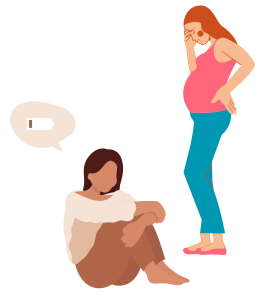 Fatigue
Fatigue
Fatigue is often experienced during early pregnancy, and this is primarily attributed to elevated levels of progesterone. Progesterone plays a crucial role in sustaining the pregnancy and supporting fetal development. However, it also has the effect of slowing down the body’s metabolism, which can contribute to feelings of tiredness.
To compensate for fatigue:
- Increase the number of hours you sleep each night
- Rest more than you think during the first trimester (energy levels will likely increase near 4th month due to the placenta being well-formed)
- Increase iron-rich foods (avoid developing iron deficiency or anemia)
Frequent urination
During pregnancy, there is a natural increase in body fluids, which contributes to enhanced kidney function. Additionally, as the uterus expands, it exerts pressure on the bladder, affecting urinary frequency and comfort.
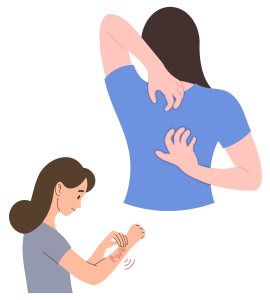 Itchy skin
Itchy skin
During pregnancy, it’s common for individuals to experience dry skin and eczema due to hormonal changes and skin stretching. As the body adapts to accommodate the growing fetus, some may develop an itchy rash known as PUPPS, or pruritic urticarial papules and plaques of pregnancy. This condition typically arises later in pregnancy and is characterized by discomfort caused by the skin stretching. Pregnant individuals need to be aware of these possible skin changes and consult a healthcare provider if they have concerns.
To help itchy skin:
- Apply moisturizer to skin
- Use antihistamines
Leg cramps
Leg cramps are often caused by the accumulation of acids in the muscles, which leads to involuntary contractions. These cramps commonly occur at night, and they are especially prevalent during the second and third trimesters of pregnancy. Understanding the causes and timing of these cramps can help manage and alleviate discomfort.
To help leg cramps:
- Use a warm pack on muscles
- Stretch and massage muscles
- Walk
- Magnesium Lactate or Citrate may be recommended by your provider
Mood fluctuations
Early pregnancy can lead to mood fluctuations due to hormonal changes in the body. These hormones can impact brain chemistry, possibly resulting in varying emotions, including feelings of joy or irritability. It’s important to note that some women may experience depression during this time. Seeking help early is essential, and discussing any symptoms with a healthcare provider can ensure appropriate care and support.
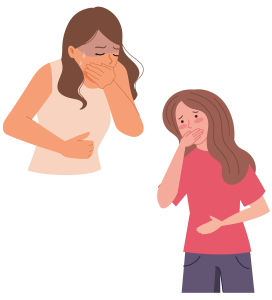 Nausea and vomiting
Nausea and vomiting
Morning sickness impacts more than 50% of pregnant women, typically arising between the 4th and 6th weeks of pregnancy. Common symptoms include loss of appetite, nausea, and vomiting. While these symptoms can be quite uncomfortable, they generally subside by the 12th week of gestation.
Shortness of breath
In the early stages of pregnancy, elevated progesterone levels enhance your lung capacity, facilitating the transport of oxygen to your baby while also helping to eliminate carbon dioxide. As a result, you tend to take deeper breaths, which can lead to feelings of shortness of breath. As the pregnancy progresses and the uterus and baby exert pressure on the diaphragm, breathing may become increasingly challenging toward the end of the term. Practicing good breathing techniques, pacing, and energy conservation techniques can help with feelings of shortness of breath with activities.
Vaginal discharge
Increased vaginal discharge is a frequent occurrence during pregnancy. However, if you experience additional symptoms such as itchiness, pain, an unusual odor, or discomfort while urinating, it could indicate an infection. Consult with your healthcare provider if you notice any of these symptoms.
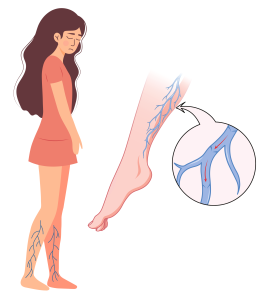 Varicose veins and lower extremity swelling
Varicose veins and lower extremity swelling
Varicose veins are frequently observed during pregnancy, primarily due to the increased blood circulation that occurs at this time, along with the pressure exerted by the growing uterus on the larger veins. This heightened pressure can lead to leg swelling, which may result in discomfort, feelings of heaviness, and cramps.
To reduce varicose veins:
- Reduce time spent standing for long durations
- Prop feet on pillows when lying down
- Wear compression stockings
- Engage in low-impact exercise such as walking or swimming
- Massage legs
Explore
References:
Better Health Channel. (2022, April 16). Pregnancy – signs and symptoms. Victoria State Government. https://www.betterhealth.vic.gov.au/health/healthyliving/pregnancy-signs-and-symptoms
Media Attributions
- pregnancy symptoms
- back
- cravings
- heartburn
- tired
- itch
- nausea
- vericose
